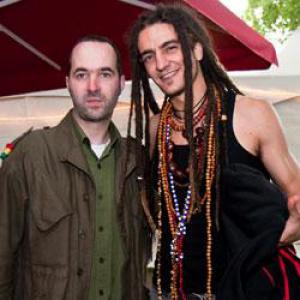Oski, the music you guys play has been labelled "musica mestiza", is that a label you're happy with?
Oski Jah-Man (vocals): "I think that label was certainly applicable when we first started out, yes. We're aware that the music we do is minority music; even in Spain we're not a mainstream band, so if labelling our music as "musica mestiza" helps to promote it, hey, why not! About fifteen years ago when the first mestizo groups appeared on the scene, that label was perfect, but today, with Ojos De Brujo focusing on flamenco, La Kinky Beat on electronics, Sergent Garcia on Latin music and us, who are more world music-oriented, it seems a bit passé."
Because many of these bands are from Barcelona or Catalonia, there's this urban myth describing you all as one big bunch of friends. Is there any truth to that story?
Oski Jah-Man: "Well we're not exactly hanging out every night, but we are close, yes, mainly because we all share more or less the same fans and public, so our paths cross all the time anyway. Professionally, we also collaborate with one another a lot. For us that's kind of special, because we grew up with the music of these guys and now we're sharing a stage with them."
Judging from names of band members like Oski Jah-Man or Blion Zion, there must be some influences of reggae or even rasta in your music?
Oski Jah-Man: "I guess you can say each band member in Zulu 9.30 brings his influences to the mix. Bernat (Guardia, bass, red.) is more into jazz and world music, Nando (Pico, saxophone, red.) is into Latin music and I'm into reggae and dancehall. I guess our stage names are a bit of a reflection of that."
Your latest album is entitled ‘Huellas' ("footprints", red).
Oski Jah-Man: "Every album is a learning experience. After the first album, ('Conecta O Revienta', red.) we reflected on where we wanted to go next and tried to make a synthesis of our sound. We chose to call it 'Huellas' because for a musician an album is like a footprint you leave behind. It's our vision on what good music should sound like. Apart from that, the footprints also symbolise the paths of the ones that went before us we want to follow in; people like Manu Chao, who kind of introduced the musica mestiza to the world, but also Bob Marley, Los Van Van, Celia Cruz, Carlinhos Brown and so on."
A lot of Catalonians don't really see themselves as being Spanish citizen (On December 22nd 1979 Catalonia was given a status of independence. Since that date it is considered an autonomous region in Spain, red.). Does that struggle for independence also appeal to you?
Oski Jah-Man: "As a band we're not very vindictive against the system. We try to see the positive side of things. We don't really speak Catalan in the band because some members are from other countries and they just wouldn't understand what we're going on about. We also carry that through in our music. We want the messages that we put out there to be as universal as possible, so a lot of people can relate to them. Personally speaking I feel Catalonian rather than Spanish. The reasons for that are diverse and set in history and politics. I don't know if I want to go as far as claiming independence, but I definitely carry Catalonia in my heart."


